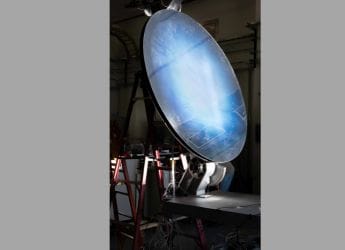- Home
- Laptops
- Laptops News
- Chipmakers Hint at Ease of Chip Supply Glut but Demand Recovery Still Slow
Chipmakers Hint at Ease of Chip Supply Glut but Demand Recovery Still Slow
The smartphone market is also improving, with cellphone shipments falling 8 percent in the June quarter.

This glut, however, has started to ease largely due to production cuts
From Intel to Samsung, global chipmakers are celebrating the beginning of the end of a semiconductor supply glut, but the outlook for demand from customers outside the artificial intelligence (AI) industry remains gloomy.
All the major markets for chips — smartphones, PCs and data centres — have shrunk this year, as both corporate customers and consumers scale back spending amid a weak global economy, high inflation and rising interest rates.
This has created an unprecedented oversupply of commodity chips, causing a record combined KRW 15.2 trillion (nearly Rs. 98,650 crore) first-half operating loss for the world's two largest memory chipmakers, Samsung and SK Hynix.
This glut, however, has started to ease largely due to production cuts and as a decline in PC shipments eased to 11 percent in the June quarter compared to a 30 percent slump in each of the previous two quarters, data from tech analysts Canalys showed.
The smartphone market is also improving, with cellphone shipments falling 8 percent in the June quarter, versus 14 percent in the first quarter, according to research firm Counterpoint.
"Demand is recovering very gradually," Woohyun Kim, chief financial officer at SK Hynix, said on an earnings call this week.
"The recent improvement in PC shipments has been mainly led by promotions and low-end models, meaning it provided limited impact on chip demand recovery," he said, adding that shipment forecasts for PCs and smartphones this year have been downgraded from earlier predictions.
While demand for chips to support generative AI has rapidly increased since OpenAI's ChatGPT was launched late last year, the sector still accounts for a small fraction of overall chip demand and is crimping corporate spending on servers, as some companies prioritize investment in AI.
Intel CEO Pat Gelsinger said on Thursday an inventory glut in server central processing units (CPUs) will persist until the second half of the year and that data centre chip sales will decline modestly in the third quarter before recovering in the fourth quarter. Intel shares rose 6.4 percent Friday after stronger than expected results.
A sluggish recovery in China, the world's biggest chip buyer, is also dampening the overall outlook.
Both Samsung and SK Hynix said China's reopening failed to live up to expectations that it would revive the smartphone market, and that they were extending production cuts of NAND memory chips, widely used in smartphones to store digital data.
Analog chipmaker Texas Instruments, which has heavy exposure to China, forecast third-quarter revenue and profit below Wall Street targets on Tuesday, bogged down by a sluggish recovery in end-market demand that has forced clients to cancel orders. Shares were up 1.5 percent Friday.
"China was roughly half of sales at the end of fiscal 2022, so China has the largest impact on TI's business," said Logan Purk, analyst at investment firm Edward Jones.
AI winners
Manufacturers of the equipment used to make chips such as KLA Corp and Lam Research are early winners of the AI boom. Both companies forecast quarterly revenue above Wall Street estimates this week. Shares were up 4.9 percent and 2.2 percent, respectively, on Friday.
"Advanced AI servers have significantly higher leading-edge logic, memory and storage content versus traditional servers, and every incremental 1 percent penetration of AI servers and data centres is expected to drive $1 billion (nearly Rs. 8,200 crore) to $1.5 billion (nearly Rs. 12, 330 crore) of additional (chip equipment) investment," Lam CEO Tim Archer said on a conference call with analysts.
Chipmakers are also increasing production of the high-end chips used to support AI related chips.
SK Hynix said demand for AI server memory had more than doubled in the second quarter compared to the first quarter. Its DRAM chips, which hold information from applications while the system is in use, sold for a higher price in the second quarter versus the first, on average.
The company leads the market in high bandwidth memory (HBM) DRAM used in generative AI. It had a 50 percent market share in HBM as of 2022, followed by Samsung's 40 percent and Micron's 10 percent, according to TrendForce.
© Thomson Reuters 2023
Get your daily dose of tech news, reviews, and insights, in under 80 characters on Gadgets 360 Turbo. Connect with fellow tech lovers on our Forum. Follow us on X, Facebook, WhatsApp, Threads and Google News for instant updates. Catch all the action on our YouTube channel.
Related Stories
- Samsung Galaxy Unpacked 2026
- iPhone 17 Pro Max
- ChatGPT
- iOS 26
- Laptop Under 50000
- Smartwatch Under 10000
- Apple Vision Pro
- Oneplus 12
- OnePlus Nord CE 3 Lite 5G
- iPhone 13
- Xiaomi 14 Pro
- Oppo Find N3
- Tecno Spark Go (2023)
- Realme V30
- Best Phones Under 25000
- Samsung Galaxy S24 Series
- Cryptocurrency
- iQoo 12
- Samsung Galaxy S24 Ultra
- Giottus
- Samsung Galaxy Z Flip 5
- Apple 'Scary Fast'
- Housefull 5
- GoPro Hero 12 Black Review
- Invincible Season 2
- JioGlass
- HD Ready TV
- Latest Mobile Phones
- Compare Phones
- Leica Leitzphone
- Samsung Galaxy S26+
- Samsung Galaxy S26 Ultra
- Samsung Galaxy S26
- iQOO 15R
- Realme P4 Lite
- Vivo V70
- Vivo V70 Elite
- Asus TUF Gaming A14 (2026)
- Asus ProArt GoPro Edition
- Huawei MatePad Mini
- Infinix Xpad 30E
- Huawei Watch GT Runner 2
- Amazfit Active 3 Premium
- Xiaomi QLED TV X Pro 75
- Haier H5E Series
- Asus ROG Ally
- Nintendo Switch Lite
- Haier 1.6 Ton 5 Star Inverter Split AC (HSU19G-MZAID5BN-INV)
- Haier 1.6 Ton 5 Star Inverter Split AC (HSU19G-MZAIM5BN-INV)
















